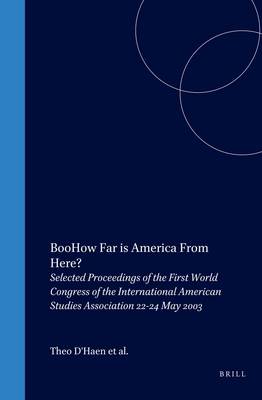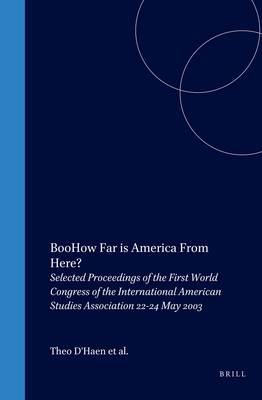
- Afhalen na 1 uur in een winkel met voorraad
- Gratis thuislevering in België vanaf € 30
- Ruim aanbod met 7 miljoen producten
- Afhalen na 1 uur in een winkel met voorraad
- Gratis thuislevering in België vanaf € 30
- Ruim aanbod met 7 miljoen producten
Zoeken
How Far Is America from Here?
Selected Proceedings of the First World Congress of the International American Studies Association 22-24 May 2003
€ 334,45
+ 668 punten
Omschrijving
How Far is America From Here? approaches American nations and cultures from a comparative and interdisciplinary perspective. It is very much at the heart of this comparative agenda that "America" be considered as a hemispheric and global matter. It discusses American identities relationally, whether the relations under discussion operate within the borders of the United States, throughout the Americas, and/or worldwide. The various articles here gathered interrogate the very notion of "America" which, whose America, when, why now, how? What is meant by "far"--distance, discursive formations, ideals and ideologies, foundational narratives, political conformities, aberrations, inconsistencies? Where is here--positionality, geographies, spatial compressions, hegemonic and subaltern loci, disciplinary formations, reflexes and reflexivities? These questions are addressed with regard to the multiple Americas within the USA and the bi-continental western hemisphere, as part of and beyond inter-American cultural relations, ethnicities across the national and cultural plurality of America, mutual constructions of North and South, borderlands, issues of migration and diaspora. The larger contexts of globalization and America's role within this process are also discussed, alongside issues of geographical exploration, capital expansion, integration, transculturalism, transnationalism and global flows, pre-Columbian and contemporary Native American cultures, the Atlantic slave trade, the environmental crisis, U.S. literature in relation to Canadian or Latin American literature, religious conflict both within the Americas and between the Americas and the rest of the world, with such issues as American Zionism, American exceptionalism, and the discourse of/on terror and terrorism.
Specificaties
Betrokkenen
- Uitgeverij:
Inhoud
- Aantal bladzijden:
- 636
- Taal:
- Engels
- Reeks:
- Reeksnummer:
- nr. 47
Eigenschappen
- Productcode (EAN):
- 9789042017566
- Verschijningsdatum:
- 1/01/2005
- Uitvoering:
- Hardcover
- Formaat:
- Genaaid
- Afmetingen:
- 155 mm x 230 mm
- Gewicht:
- 1215 g

Alleen bij Standaard Boekhandel
+ 668 punten op je klantenkaart van Standaard Boekhandel
Beoordelingen
We publiceren alleen reviews die voldoen aan de voorwaarden voor reviews. Bekijk onze voorwaarden voor reviews.







